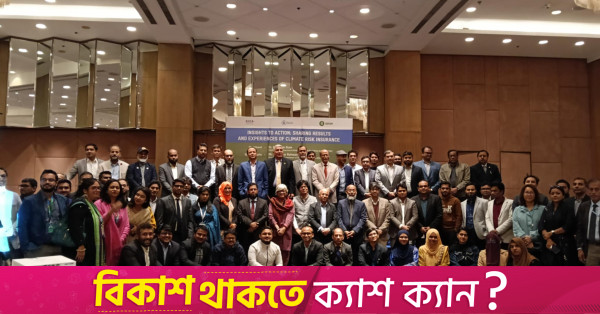At an event organised by Oxfam in Bangladesh and the World Food Programme (WFP) at a hotel in Dhaka. Photo: Courtesy
“>

At an event organised by Oxfam in Bangladesh and the World Food Programme (WFP) at a hotel in Dhaka. Photo: Courtesy
Economists and climate experts have called on the government to institutionalise climate risk Insurance as a critical tool to support disaster-prone farmers in Bangladesh, address the impacts of climate change, and secure livelihoods and national food security.
They made the call at an event titled “Insights to Action: Sharing Results and Experiences of Climate Risk Insurance (CRI)” organised by Oxfam in Bangladesh and the World Food Programme (WFP) at a hotel in Dhaka today.
In his keynote presentation, Mohammad Moniruzzaman Khan, associate professor of the Institute of Disaster Management and Vulnerability Studies at Dhaka University, said the climate risk insurance project started in 2020 with the aim of providing flood index and weather index-based insurance to marginalised farmer households.
Bangladesh stands at the frontline of climate change, enduring its harshest impacts. The climate risk insurance is not merely a financial tool—it’s a protection for farmers and a cornerstone of resilience.
Junsu Kim, deputy country director of Koica
To date, over 45,000 households or 180,000 beneficiaries at 36 unions of Kurigram are covered under the innovative risk transfer tool, he said.
Addressing as chief guest, M Aslam Alam, chairman of the Insurance Development and Regulatory Authority, said, “Bangladesh is a climate-vulnerable country, and we need to be innovative to address the challenges of climate change.”
Razwanur Rahman, director general of the Department of Disaster Management, emphasised on the integration of index-based climate risk insurance into national disaster risk management strategies and climate adaptation plans.
The event highlighted the current realities of climate change, milestones, successes, and transformative impacts of the climate risk insurance project, which has been collaboratively implanted by Oxfam in Bangladesh and the WFP over the past five years with the support of Korea International Cooperation Agency (Koica).
Junsu Kim, deputy country director of Koica, said, “Bangladesh stands at the frontline of climate change, enduring its harshest impacts. The climate risk insurance is not merely a financial tool—it’s a protection for farmers and a cornerstone of resilience.”
Riccardo Suppo, head of programme of WFP Bangladesh, said, “Climate risk insurance empowers vulnerable farming communities by providing timely financial support during climate shocks. This initiative reflects our commitment to building resilience, ensuring food security, and advancing equitable development in the face of growing climate challenges.”
The daylong event concluded with recommendations for advancing climate risk insurance in Bangladesh, including nationwide promotion, policy support for private sector involvement, platforms to encourage private investment in climate risk insurance products, and leveraging global climate finance for insurance premium support as a least developed country.


